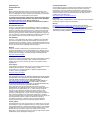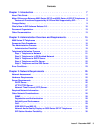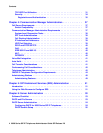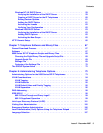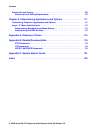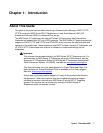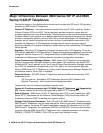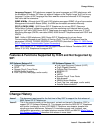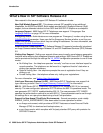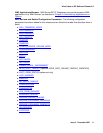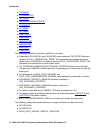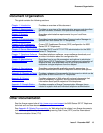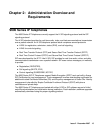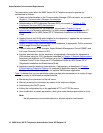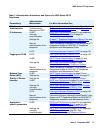
Introduction
10 9600 Series SIP IP Telephones Administrator Guide SIP Release 2.0
What’s New in SIP Software Release 2.0
New material in this issue to support SIP Release 2.0 software includes:
New GigE Models Support SIP - This release extends SIP capability to two additional
telephones, the 9630G and 9640G. Both models provide built-in Gigabyte Ethernet (GigE)
support, but are otherwise identical to their 9630 and 9640 SIP IP telephone counterparts.
Language Support - 9600 Series SIP IP Telephones now support 13 languages. See
Language Selection
on page 107 for more information.
Emergency Button - Administrators can now program an “Emergency” number using the new
PHNEMERGNUM
parameter. Users can dial the Emergency Number whether or not they are
logged into the telephone from which they are calling for assistance. For more information, see
Emergency Number Administration
.
Administration Enhancements - SIP Software Release 2.0 supports functionality introduced
on Avaya Communication Manager Release 5.0 and SIP Enablement Services (SES) Release
5.0.
Visiting User Support - Visiting user support allows users to easily move between geographic
locations while retaining their telephone extension and settings. 9600 Series SIP IP Telephones
can be provisioned through the settings file VU_MODE
configuration parameter to one of three
modes:
● No Visiting User - the telephone operates “normally” and has no user interface impact for
normal operation. The telephone can be forced to a “registered Inactive” state when a
visiting user registers elsewhere.
● Optional Visiting User - the telephone prompts the user at registration time if they are
visiting or not.
● Forced Visiting User - the telephone allows only visiting user registrations.
For more information, see Visiting User Administration
.
Link Layer Discovery Protocol (LLDP) - 9600 Series SIP IP Telephones now support link
layer discovery protocol. See Link Layer Discovery Protocol (LLDP)
for information.
802.1X - 9600 Series SIP IP Telephones now support IEEE standard 802.1X for increased
security. The new configuration parameter DOT1X defines the 802.1X operational mode. The
new parameter DOT1XSTAT enables/disables 802.1X. The new parameter DOT1XEAPS
specifies the authentication method to use with 802.1X. These parameters can be set through
the settings file or on a per-phone basis using a local Craft procedure.
Support for Non-Avaya (Third Party) Environments - Several parameters, most notably
ENABLE_AVAYA_ENVIRONMENT, have been added to cover operation for either:
● an Avaya environment, which provisions SIP/AST features and uses Personal Profile
Manager (PPM) for download and backup/restore, or
● a non-Avaya mode, which complies with 3rd party standard SIP proxy with provision for
SIPPING 19 feature.



